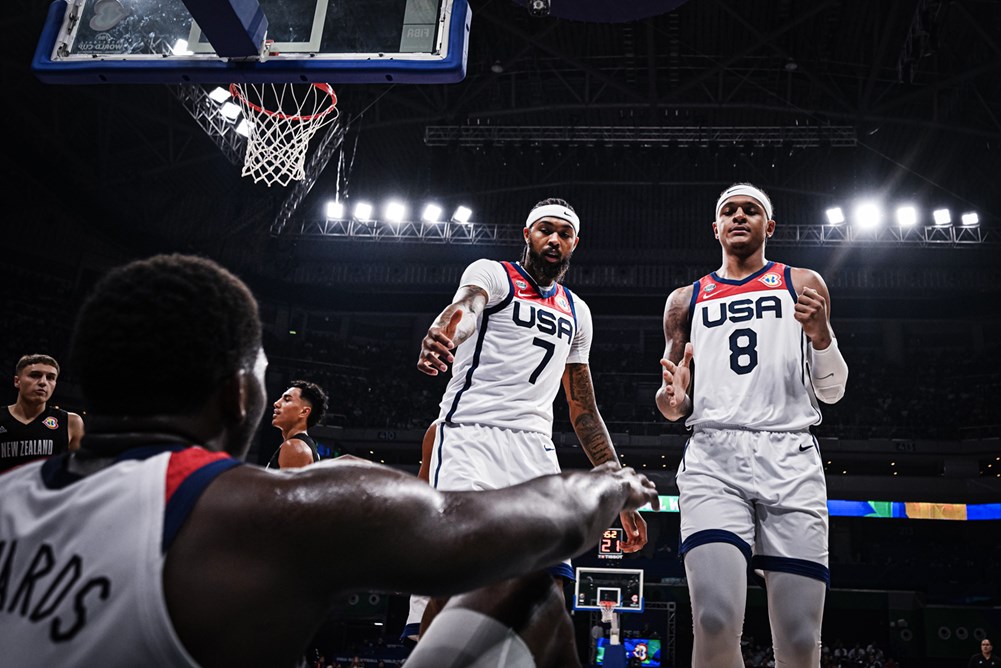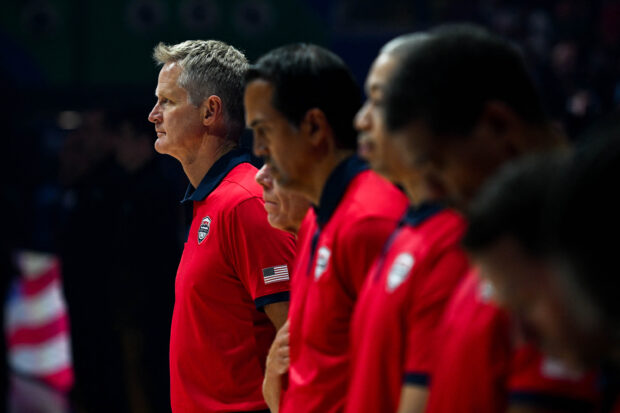Team USA is learning to roll with the hits at Fiba World Cup

Team USA’s Brandon Ingram and Paolo Banchero gesture to help Anthony Edwards in a Fiba World Cup game. –FIBA BASKETBALL
MANILA, Philippines — It was late in the first quarter of Team USA’s team’s opener at the Fiba World Cup. Austin Reaves was in transition and tossed a lob to Cam Johnson, who got sandwiched in midair by two New Zealand defenders and took a hard fall.
Steve Kerr expected such plays to happen.
The U.S. coach knows that every opponent awaiting the Americans in this tournament will likely be very aggressive, hoping that tactic works to derail the only team in the World Cup with a roster composed entirely of NBA players. New Zealand tried; the U.S. shook off a slow start to win 99-72 and now faces Greece on Monday.
“I know everybody walked in this morning a little frustrated,” Kerr said Sunday as the Americans got loose for practice. “But we won by 27 points. And so, that’s the lesson. In FIBA, it’s so physical. Everybody is going to try to beat the crap out of us because that’s their best chance to beat us.”
It’s an adjustment for the Americans, but so far, so good.
“We understood that this would be part of the process,” Johnson said.
It wasn’t quite like that in the five exhibition games the Americans played on their way to the World Cup because, well, they were just exhibitions. A game against Spain earlier this month against the reigning World Cup winners and FIBA’s No. 1-ranked team — the U.S. is ranked No. 2 — got physical at times, but that was to be expected and nothing got out of hand.

Team USA’s Head Coach Steve Kerr (L) gestures during the FIBA Basketball World Cup group C match between US and New Zealand at the Mall of Asia Arena in Pasay city, suburban Manila on August 26, 2023. (Photo by SHERWIN VARDELEON / AFP)
But in the World Cup, the stakes are higher and so is the intensity. Johnson stayed down for a few seconds after the big hit, then made his way to his feet uninjured. He said Sunday that he was fine and didn’t show any aftereffects.
“That’s their way of playing, that’s their way of trying to stay in the game and whatnot,” Johnson said. “It’s definitely different than how we’ve been playing, but we’re all capable of adjusting and figuring it out. I think the thing that’s important for us to keep in mind is what’s the legal limit of our physicality. You can go out there and fight and throw punches and all that all game, but if you get three, four quick fouls, your game is basically over.”
Kerr — as Gregg Popovich did before him as the U.S. coach, and as Mike Krzyzewski did before that — finds himself reminding his team often about how the FIBA game isn’t the NBA game. It’s called differently and defenders can be much more aggressive.
Kerr explains it to players like this: In the NBA, rules lean toward helping scoring, while in FIBA it’s the opposite. The solution, he says, is to weather the storms, rely on depth and keep cool.
So far, it’s working.
“Our threat is that we have 12 guys who are ready to make a great four- or five-minute push,” Kerr said. “And we keep coming with another wave and another wave, another wave. So, teams can be physical with us, but they have to do that for 40 minutes. As long as our guys stay composed and poised like they did (Saturday), then we’re going to be tough to beat and I think that’s the lesson here early on.”